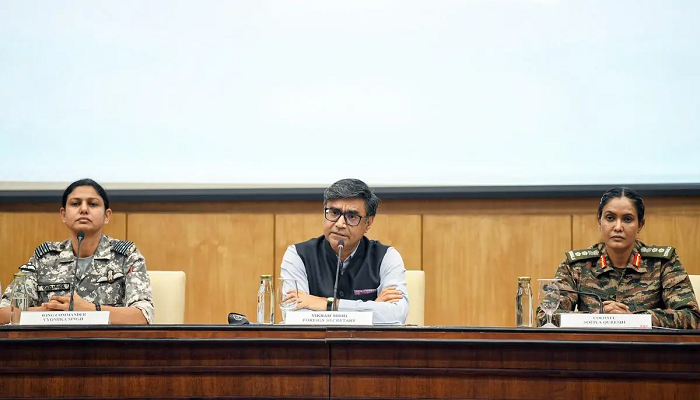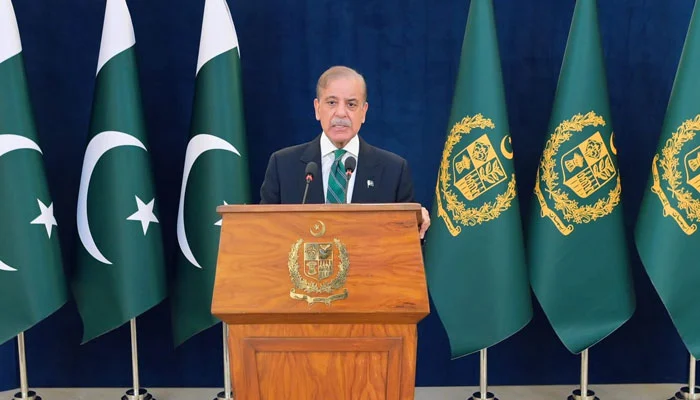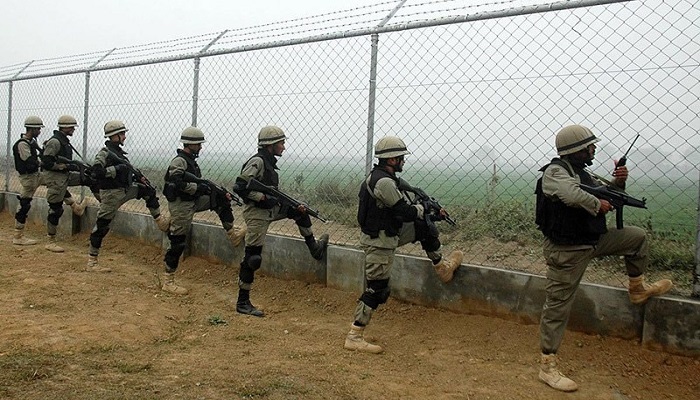India and Pakistan have reached a ceasefire agreement after days of escalating violence along the Kashmir border, offering a temporary reprieve to residents of the disputed region.
However, the fragile truce was quickly marred by reports of ceasefire violations and explosions in Srinagar. Despite the ceasefire announcement, unresolved issues such as the suspension of the Indus Waters Treaty (IWT) and the broader Kashmir conflict remain at the forefront of ongoing tensions between the two nuclear-armed nations.
The ceasefire came into effect at 17:00 local time (11:30 GMT) on Saturday, following intense military exchanges between the two nuclear-armed nations. Explosions were reported in parts of Indian-administered Kashmir, including Srinagar, within hours of the ceasefire announcement, raising concerns that the truce may not hold.
South Asia on Edge as India and Pakistan Trade Fire, Drones, and Accusations
India’s Foreign Secretary Vikram Misri confirmed the ceasefire but expressed frustration over the violations, saying, “For the last few hours, there have been repeated violations of the understanding arrived at earlier.” Misri added that India’s military was instructed to “deal strongly” with any breaches. Despite these concerns, Pakistan’s Information Minister Attaullah Tarar denied reports of violations, insisting that Pakistan was upholding the ceasefire.
The ceasefire follows several days of escalating violence, including airstrikes and artillery exchanges. India claims it targeted terrorist camps in Pakistan, while Pakistan reportedly shot down five Indian jets, including three Rafales. In response, India launched several drones and strike missiles at what it called military installations in Pakistani cities. Meanwhile, last night, Pakistan carried out its “Operation Bunyan un Marsoos,” striking more than 20 targets in India, including locations in Udampur, Rajouri, Pathankot, and Beas.

However, the ceasefire deal did not address the core issues behind the violence. A key point of contention remains the Indus Waters Treaty (IWT), a vital water-sharing agreement signed in 1960 that regulates the division of water from the Indus River and its tributaries between the two nations. India withdrew from the treaty last month, citing security concerns following an attack in Kashmir that it blamed on Pakistan. The suspension of the IWT has had serious implications for Pakistan, as the treaty provides water for 80% of the country’s agricultural land.
US Urges India-Pakistan Dialogue Amid Rising Tensions Following Pahalgam Terror Attack
Pakistan has strongly denied involvement in the violence and has indicated plans for international legal action regarding the suspension of the treaty. “Indus Waters Treaty was not really a part of [the ceasefire] discussions,” a source from Pakistan’s water ministry said. “We are preparing to take legal steps.”
Meanwhile, Indian government sources confirmed that the country’s stance on the treaty remained unchanged. Despite the ceasefire, India has continued measures against Pakistan, including the suspension of trade and a halt on issuing most types of visas. These measures were taken as part of a tit-for-tat response following the attack in Kashmir.

“All measures taken against Pakistan, including on trade and visas, will remain in place despite the pause in violence,” two Indian government sources said. India’s foreign ministry did not immediately respond to a request for comment on the matter.
Pakistan to Challenge India’s Indus Treaty Suspension as Delhi Pressures IMF on Loans
The international community has expressed relief over the ceasefire, but there is skepticism about its sustainability. Sahar Khan, a security analyst based in Washington, cautioned that while the ceasefire is a positive development, it remains fragile. “This is still a very delicate and fragile ceasefire,” Khan said. “While most people on the ground are relieved to see it, the underlying issues, particularly Kashmir and water-sharing, remain unresolved.”
Pakistan’s Prime Minister Shehbaz Sharif expressed hope that the ceasefire could be the beginning of a broader resolution to the Kashmir conflict. “We hope this ceasefire will lead to a lasting peace and a solution to the Kashmir issue,” Sharif said in a televised address.

However, the situation remains precarious. With the Indus Waters Treaty suspended and trade measures still in place, many fear that the ceasefire may only be temporary. Local residents in Kashmir voiced both relief and concern. “This is a wise decision after so many lives have been lost,” said Rumaisa Jan, a resident of Srinagar. “But we need a permanent solution to end the violence.”
Tensions Rise in Pakistan-Administered Kashmir Amid India Standoff
Firdous Ahmad Sheikh, a travel agency owner in Srinagar, echoed these concerns. “We fear that things could escalate again. These countries must come together and find a political solution to Kashmir,” he said. “We pray that our children don’t have to witness such times again.”
As the ceasefire holds for now, the international community watches closely, hoping that this temporary halt in fighting will lead to meaningful talks and a long-term solution to the Kashmir conflict.



